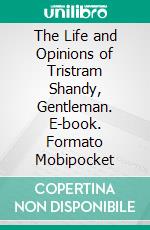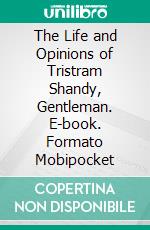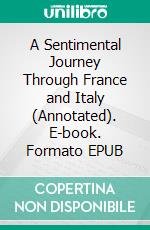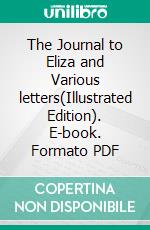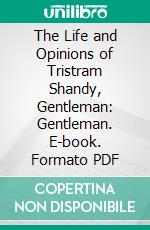The Life and Opinions of Tristram Shandy, Gentleman. E-book. Formato Mobipocket - 9788832546774
di Laurence Sterne
edito da IONLINESHOPPING.COM , 2019
Formato: Mobipocket - Protezione: nessuna
The Life and Opinions of Tristram Shandy, Gentleman (or Tristram Shandy) is a novel by Laurence Sterne. It was published in nine volumes, the first two appearing in 1759, and seven others following over the next seven years (vols. 3 and 4, 1761; vols. 5 and 6, 1762; vols. 7 and 8, 1765; vol. 9, 1767). It purports to be a biography of the eponymous character. Its style is marked by digression, double entendre, and graphic devices.
As its title suggests, the book is ostensibly Tristram's narration of his life story. But it is one of the central jokes of the novel that he cannot explain anything simply, that he must make explanatory diversions to add context and colour to his tale, to the extent that Tristram's own birth is not even reached until Volume III.
Consequently, apart from Tristram as narrator, the most familiar and important characters in the book are his father Walter, his mother, his Uncle Toby, Toby's servant Trim, and a supporting cast of popular minor characters, including the chambermaid, Susannah, Doctor Slop, and the parson, Yorick, who later became Sterne's favourite nom de plume and a very successful publicity stunt. Yorick is also the protagonist of Sterne's second work of fiction A Sentimental Journey Through France and Italy.
Most of the action is concerned with domestic upsets or misunderstandings, which find humour in the opposing temperaments of Walter—splenetic, rational, and somewhat sarcastic—and Uncle Toby, who is gentle, uncomplicated, and a lover of his fellow man.
In between such events, Tristram as narrator finds himself discoursing at length on sexual practices, insults, the influence of one's name, and noses, as well as explorations of obstetrics, siege warfare, and philosophy as he struggles to marshal his material and finish the story of his life.
Sterne's presence inside the narrative changed the course of traditional novelistic interpretations as his narrative structure digresses through many jumbled and fragmentary events into a non-traditional, dual overlapping plot. These digressive methods reflect his inability to simply explain each event as it occurs, as he frequently interrupts these events with commentary about how the reader should understand and follow each event.
He relies heavily on his reader's close involvement to the text and their interpretations of the non-traditional plot. Tristram's presence inside of the narrative as the narrator engages the imagination and his use of visual strategies, such as the marbled and blank pages, reflects the importance of the reader’s participation in the novel.
As its title suggests, the book is ostensibly Tristram's narration of his life story. But it is one of the central jokes of the novel that he cannot explain anything simply, that he must make explanatory diversions to add context and colour to his tale, to the extent that Tristram's own birth is not even reached until Volume III.
Consequently, apart from Tristram as narrator, the most familiar and important characters in the book are his father Walter, his mother, his Uncle Toby, Toby's servant Trim, and a supporting cast of popular minor characters, including the chambermaid, Susannah, Doctor Slop, and the parson, Yorick, who later became Sterne's favourite nom de plume and a very successful publicity stunt. Yorick is also the protagonist of Sterne's second work of fiction A Sentimental Journey Through France and Italy.
Most of the action is concerned with domestic upsets or misunderstandings, which find humour in the opposing temperaments of Walter—splenetic, rational, and somewhat sarcastic—and Uncle Toby, who is gentle, uncomplicated, and a lover of his fellow man.
In between such events, Tristram as narrator finds himself discoursing at length on sexual practices, insults, the influence of one's name, and noses, as well as explorations of obstetrics, siege warfare, and philosophy as he struggles to marshal his material and finish the story of his life.
Sterne's presence inside the narrative changed the course of traditional novelistic interpretations as his narrative structure digresses through many jumbled and fragmentary events into a non-traditional, dual overlapping plot. These digressive methods reflect his inability to simply explain each event as it occurs, as he frequently interrupts these events with commentary about how the reader should understand and follow each event.
He relies heavily on his reader's close involvement to the text and their interpretations of the non-traditional plot. Tristram's presence inside of the narrative as the narrator engages the imagination and his use of visual strategies, such as the marbled and blank pages, reflects the importance of the reader’s participation in the novel.
Ean
9788832546774
Titolo
The Life and Opinions of Tristram Shandy, Gentleman. E-book. Formato Mobipocket
Autore
Editore
Data Pubblicazione
2019
Formato
Mobipocket
Protezione
nessuna
Punti Accumulabili
